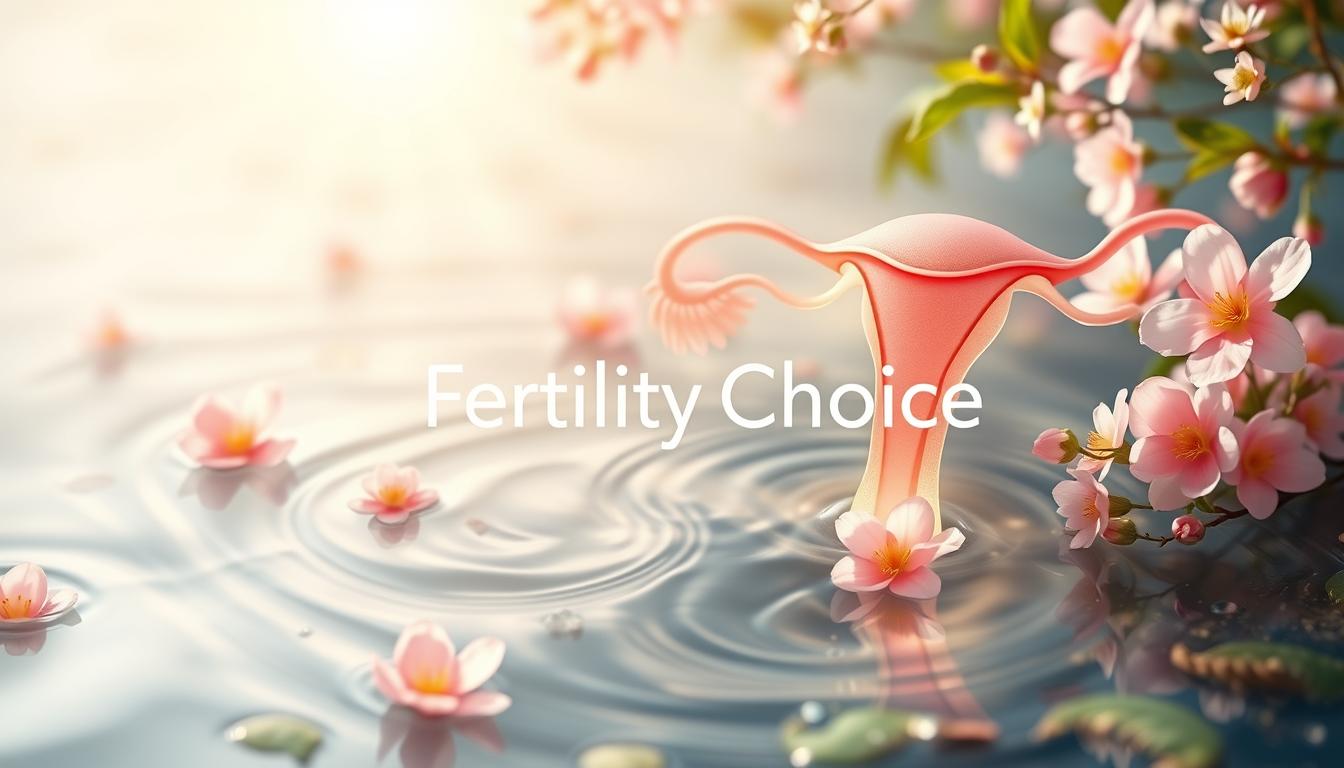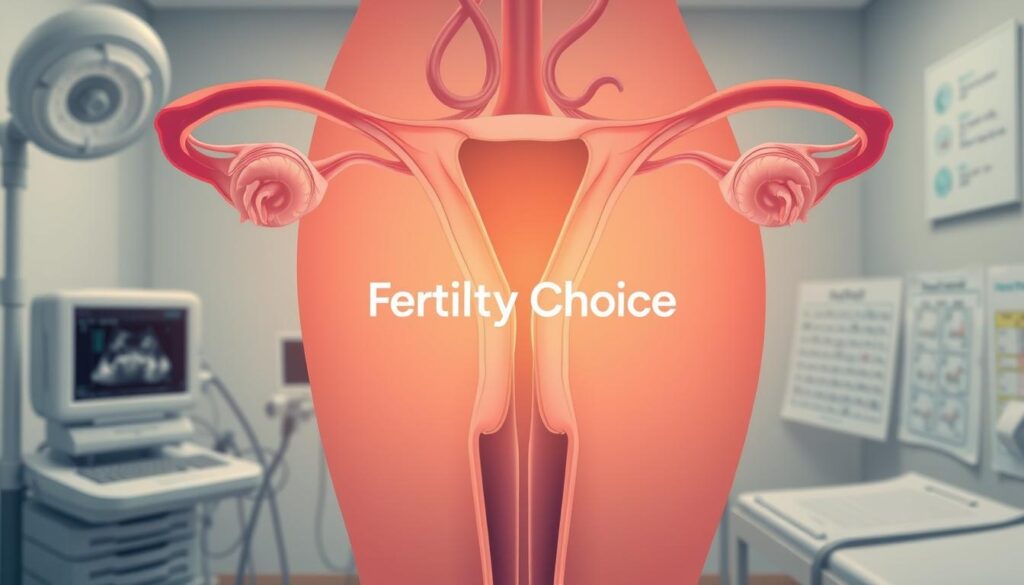
Blocked fallopian tubes are a big problem for women trying to get pregnant. They can cause infertility, affecting 11% to 67% of women1. Many women in South Africa are worried about how to unblock these tubes.
It’s important for women trying to conceive to know about blocked fallopian tubes. These tubes can cause infertility and increase the risk of ectopic pregnancy1.
With the right info and support, women can improve their chances of getting pregnant. IVF can help by allowing egg and sperm to meet outside the body1. Since 1978, over eight million babies have been born through IVF worldwide2.
Tubal factor infertility affects about 19% of women with primary infertility3. IVF has helped over 5 million women get pregnant since 19833. So, it’s vital for women with blocked tubes to learn about treatment options.
Blocked fallopian tubes are a big reason for infertility in women, making up 25-35% of cases4. These tubes can get blocked or damaged by things like pelvic inflammatory disease (PID), endometriosis, and past surgeries. Knowing why these tubes get blocked is key to finding the right treatment, like natural remedies or medical treatments.
Some main reasons for blocked fallopian tubes include:
If you think you might have blocked fallopian tubes, see a doctor right away. Early treatment can really help your chances of getting pregnant. Sometimes, natural remedies or medical treatments are suggested. Other times, more serious options like in vitro fertilization (IVF) might be needed5.
Studies show IVF success rates for women with blocked tubes are about 40-50% per try4. The success of treatments for blocked tubes varies, from 10% to 80%5. Women with blockages closer to the uterus have a better chance of getting pregnant after treatment than those with more serious blockages or scarring5.
Blocked fallopian tubes can lead to infertility and pelvic pain6. They can stop the egg from being fertilized6. Pelvic pain might also occur due to the blockage or other issues7.
Some women might face irregular menstrual cycles or abdominal pain7. Others might not show any symptoms at all. It’s crucial to see a doctor if you’re having trouble getting pregnant6.
Here are some common signs of blocked fallopian tubes:
Seeing a doctor is key if you notice these symptoms. Early treatment can boost your chances of getting pregnant6. Natural or surgical methods can help unblock tubes, improving fertility and lowering risks7. Issues like pelvic infections and endometriosis can cause blockages7.
In summary, blocked fallopian tubes can lead to various symptoms. It’s vital to get medical help if you notice any. Understanding these symptoms and causes can help women improve their fertility and avoid complications6.
| Symptom | Description |
|---|---|
| Infertility | Difficulty conceiving after 1 year of trying without success6 |
| Pelvic pain | Pain in the pelvic area, which can be caused by the blockage or other underlying conditions7 |
Doctors use imaging tests and surgery to find out if fallopian tubes are blocked. They want to know how bad the blockage is. This helps them decide on treatments like surgery to clear the tubes. About 30% of women with trouble getting pregnant might have blocked tubes8.
The Hysterosalpingogram (HSG) test uses dye and X-rays to see the tubes. It’s good at finding blockages, but it’s very painful. In fact, it’s 110 times more painful than another test called Parryscope9.
Laparoscopy is a surgery that lets doctors look at the tubes inside the belly. It takes about 1-2 weeks to get better after this surgery8.

Blocked tubes are a big reason for women’s infertility, affecting 25-35% of them6. If a woman can’t get pregnant after a year, she’s considered infertile. If both tubes are blocked, only 5% of women can get pregnant naturally after treatment6.
Women facing infertility due to blocked fallopian tubes have several treatment options. It’s important to understand how to unblock these tubes to make informed choices about fertility treatments. About one in four women face infertility because of blocked or damaged tubes10. IVF has a success rate of 40% to 45% for women under 3510.
Surgery and in vitro fertilization (IVF) are treatments for blocked fallopian tubes. Surgery can remove blockages or repair damaged tubes. IVF, on the other hand, can bypass the blocked tubes. The success rate of tubal ligation reversal varies, from 40% to 80%, based on age and health11. Causes include pelvic inflammatory disease, endometriosis, past ectopic pregnancies, and more12.
Some common surgeries for blocked fallopian tubes include:
Talking to a fertility specialist is key to finding the best treatment. They can help figure out how to unblock fallopian tubes and improve fertility chances.
Lifestyle changes can greatly help improve fertility. Eating a diet full of fruits, vegetables, and whole grains is good for reproductive health13. Regular exercise boosts overall health and can help conceive14. Stress management through meditation and yoga can also help15.
Some key lifestyle changes for better fertility include:
Smoking and heavy drinking can harm fertility13. Smoking can increase infertility risk by 60% compared to non-smokers. Heavy drinking can raise ovulation issues by 40%13. Making healthy choices and avoiding harmful habits can boost conception chances and lower infertility risk.
Natural remedies for blocked fallopian tubes, like dietary changes and herbal supplements, can help improve fertility14. Sometimes, treatments like surgery and IVF are needed15. Combining healthy lifestyle choices with natural remedies and medical treatments can increase conception chances and improve reproductive health.
| Lifestyle Change | Benefits for Fertility |
|---|---|
| Healthy diet | Supports reproductive health and increases chances of conception13 |
| Regular exercise | Improves overall well-being and increases chances of conception14 |
| Stress management | Reduces stress and improves fertility15 |
Women with fallopian tube obstruction might find natural ways to improve fertility. Methods like acupuncture and herbal remedies can help16. They can reduce inflammation, aid in healing, and boost blood flow to the reproductive areas.
Research shows Chinese herbal medicine can double pregnancy rates in women with infertility16. A 2015 study found a 60% pregnancy rate with Chinese herbal medicine, compared to 33% with Western medicine17. Yoga and manual pelvic physical therapy may also help by reducing stress and enhancing fertility17.
It’s important to use these alternative therapies alongside traditional treatments. Women with blocked fallopian tubes should talk to a healthcare professional about their treatment options. Key points to remember include:

Adding alternative therapies to their treatment plans might help women with blocked fallopian tubes get pregnant. But, it’s vital to approach these therapies with a critical and informed mindset. We must consider the evidence and potential risks18.
| Alternative Therapy | Potential Benefits |
|---|---|
| Acupuncture | Improves blood flow to reproductive organs |
| Herbal Remedies | Reduces inflammation and promotes healing |
| Yoga and Manual Pelvic Physical Therapy | Reduces stress and improves fertility outcomes |
Having a support system is crucial for dealing with the emotional side of blocked fallopian tubes19. Women facing this issue often feel isolated. But, connecting with others who understand can help a lot. Support groups and counseling offer a safe space to share and find support2.
Support systems bring many benefits to women with blocked fallopian tubes. These include:
It’s vital for women to have clear, accurate info on their treatment options10. Knowing the benefits and risks of each option helps them make informed choices. This way, they can increase their chances of a successful outcome, whether through surgery or other treatments.
Dealing with blocked fallopian tubes in South Africa can be tough. It’s key to find a specialist who knows how to treat this issue. Knowing what your health insurance covers is also important for making treatment choices20. Many health insurances are accepted, but some things are not covered, and you might have to pay a bit extra20.
Finding the right specialist is a big part of getting the right care. In South Africa, you can choose from fertility specialists and gynecologists. It’s important to pick someone who knows about blocked fallopian tubes and can help you figure out how to fix them21. You might hear about treatments like IUI and IVF, so it’s good to know what they are and how they work21.
Also, knowing what your health insurance covers helps you make better choices. Many insurances pay for tests like blood work and cholesterol checks20. Some tests, like Pap smears, don’t need an appointment, but others might20. By finding the right specialist and understanding your insurance, you can take charge of your health and make smart choices about treating blocked fallopian tubes.
Getting through the healthcare system in South Africa takes time and effort. But by doing your research and asking questions, you can find the best specialist and understand your insurance. This way, you can get the best care for your blocked fallopian tubes and learn how to fix them21.
Many women have shared their stories about dealing with blocked fallopian tubes. They offer insights and support to others facing similar issues22. Some have tried natural remedies like changing their diet and using herbal supplements. Others have chosen medical treatments like surgery or IVF23.
Some women have found success with natural remedies, even getting pregnant after trying them23. Others have had surgery, like laparoscopic procedures, with mixed results22. It’s important to remember that everyone’s journey is different. What works for one might not work for another.
Common themes in these stories include the need to see a doctor if symptoms don’t go away. They also highlight the importance of emotional support and exploring all treatment options2223.
| Treatment Option | Success Rate |
|---|---|
| Natural Remedies | Up to 70%23 |
| Fallopian Tube Treatment (Surgery) | Up to 50%22 |
| IVF | Up to 40%23 |
The future of endometriosis treatment looks bright, with new research and innovations on the horizon24. This condition affects about 1 in 10 girls, women, and gender diverse people. Studies show that surgery can cure over 90% of women by removing endometriosis and cysts25.
Yet, 30% of women might see symptoms return after surgery. The effect of surgery on fertility for severe cases with cysts is still unclear24.
Advocates and researchers are pushing hard to spread awareness and find better treatments26. For women under 35, removing visible endometriosis might help with pregnancy. If the endometriosis is moderate to severe, IVF is often suggested if pregnancy doesn’t happen within 6 to 12 months after surgery26.
As these advancements keep coming, women with endometriosis and blocked fallopian tubes have reason to be hopeful. They can look forward to better fertility chances and a higher quality of life.
Stay Connected and Get Personalized Assistance
Thank you for reading! We hope you found this post helpful and informative. If you have any questions or need further assistance, please reach out. We’re here to help you on your journey
